Why Teach English in South Korea at Public Schools?
It is a Great Option
Story and photos by Wayne Johnson

|
|
Public school students in South Korea during a break.
|
After working at a language institution in Thailand I decided to apply for a job in a South Korean high school. Of all the attractions in Thailand, money wasn ’t one of them, so I followed a well-trodden path to the land of the Morning Calm. However, money wasn ’t the only factor. I also desired a change of scenery, as one of the major advantages of a career in EFL teaching is the chance to experience many different countries.
In South Korea, jobs in Public Schools are sought after because the salaries are good and, just as importantly, they are paid on time. Many of the major complaints found on websites and message boards regarding teaching in South Korea revolve around wages being paid late or withheld for a variety of reasons. Such is not the case in the Public School system. Also, if you work for a school as opposed to a Hogwan (private institute) you have a respected position in Korean society and people will treat you accordingly.
The most popular and easiest way to get a job in a Public school is through the GEPIK program — a system run by the Gyeonggi-do Government to place native speakers in its schools. This province surrounds but does not include Seoul, and although it consists of large cities like Suwon, it mainly comprises towns and villages.
I applied for a position through an online recruiter and was placed in a small rural High School which claimed it was only an hour away from Seoul (you will soon discover that South Koreans have a habit of underestimating distances). I have always had a typical Englishman ’s longing for the countryside, despite or perhaps due to living in cities all my life, so I decided to give country living a go.
Despite having lived overseas for two years, the first few weeks were a definite culture shock. First of all, I had to confront my new celebrity status. The school never had a native speaker work there before. I knew it was going to be a strange experience when on the first day my name was greeted with cheers as I was introduced to the students alongside the new Korean teachers. It felt a bit awkward and I wondered whether to bow or do a sort of Prince Charles regal wave while standing on the assembly stage. In the following days and weeks I was constantly greeted with screams of “teacher we love you ” from the boys and the girls. Gaggles of students would come into my room and just stare at what I was doing and giggle every time I spoke. It was amusing, but such an experience is not recommended for anyone leaving home for the first time as it can be a bit intense being a focus of attention in the school and surrounding area. Also, in a rural school you become a sort of status symbol for the school. The Principal will frequently drag you out of class to meet some dignitary or another. You are a commodity of the school and are expected to behave like one. However, if you play along in good spirits your attitude will be appreciated. When the time comes for you to ask for a favor from them it is more likely to be granted. Korean society is all about preserving "face" and the Principal is the one person you want to keep happy while you are there.
South Korean high schools are very traditional, especially if you are coming from the U.S. or U.K. For example, corporal punishment is allowed and people will be shocked if you voice objections to students getting hit by a thick wooden stick. Junior teachers are also expected to bow and show respect to the senior teachers. As a foreigner you will still be expected to show some deference but you will be spared much of the politics. This is chiefly because you are likely to be given your own English room and will be excused from the weekly staff meetings. While this suited me perfectly, some people may feel like they are being excluded from the other teachers who all sit together in the staff room. However, in your own room you will have a computer with Internet access and have time to lesson plan or write emails.
Regarding the actual experience of teaching, novices should again beware. The level of English spoken by high school students can be very low and resources may be minimal or non-existent. Korean textbooks are terrible and the Teacher’s Guides are written in Korean, so don ’t expect any help there. Some schools will have a budget to buy your own textbooks or may even let you subscribe to English magazines if you ask. It can be useful to bring your own textbooks — or at least to try and be as creative as possible. The students will appreciate some fun in their classroom as it is likely that their previous experience of learning English consists of grammar, grammar and then a little bit more grammar. Eyebrows may be raised by other teachers if you coax the kids into playing games or entering role-playing conversations, but such creativity will be appreciated by the students. Your co-workers will either embrace your methods or dismiss you as a crazy foreigner and let you get on with it.

|
|
Uniformed public school students in class.
|
One aspect of working for the Government school system which can be either a blessing or a curse is co-teaching. In most classes you will have a Korean teacher physically by your side in the classroom. Obviously this helps when the students barely know the alphabet, but it can be problematic when you are trying to discipline the class and the students don ’t know whether to listen to you or the Korean teacher. And you will likely have very different ideas of how to motivate a class and how to teach a language. Whether your experience at the school is positive or negative depends in a large part on your relationship with the co-teacher. While you cannot choose the personality you work with you can minimize the problems. The main rule is to remember that if there is a dispute you don ’t lose your temper, keep calm and reasonable and even massage their ego a bit in order to get your own way. As mentioned previously, much of life teaching in Korea is about maintaining face. If you remain positive in front of others and look enthusiastic you will have few problems, even if you are secretly weeping onto your keyboard when the students have left.
There are some horror stories about working in South Korea. While some are justified, many are not. Remember that most people who contribute to the message boards on the web have had negative experiences. Take into account what you read but make your own decisions. Many of the gripes center around working in Hogwans. While there are many true stories about teachers not being paid and being treated awfully, there are also advantages to working in institutes. For the novice teacher they are probably a better bet than the Public Schools. Class sizes are small and students often have similar language levels. By contrast, high school class sizes can exceed 35, and students with learning disabilities sit alongside kids looking to go to good Universities. At a private language institute you are also more likely to be around other foreigners either at your school or in the city. At a high school you will be the only westerner and this may cause feelings of isolation. However, if you really want to experience South Korea then I recommend working in the Public Schools as you will be immersed in Korean culture. You will be amazed at how friendly people are towards you and how keen the students are to learn from you.
Visa and Work Permit
All nationals employed as native speaking English teachers have to apply for an E-2 visa. To get the visa you need to provide Korean immigration with your original degree certificate, a photocopy of your passport and transcripts from your degree course. You will have to send these to the school or recruitment agency in Korea and they will send you a letter which you must take to your nearest Korean embassy. You can get your E-2 within two days and the cost is approximately $45. If you decide to look for work while in South Korea then you will be required to leave the country to gain the visa — usually in Japan — which your school will pay for.
Costs
Costs are pretty cheap although not unbelievably so. The big money saver for those working in South Korea is that accommodations are already paid for and taxes are very low at 3–5% of your salary. I was paid 2.2 million Won a month and my net pay after tax, pension and health insurance was 2 million Won a month. Working outside of Seoul will allow you to save between a third or a half of your monthly salary and in the Public Schools your costs are further reduced by eating lunch at school every day. In contrast to places like Japan the school will pay for your return airfare to Korea — half when you arrive and half when you leave — long with a one month bonus payment at the end of your contract
.
Getting a Job
The peak times for Public School hiring are in February and during the summer vacation in July. A popular place to look for recruiters hiring for these positions is Eslcafe.com. At these times there will be dozens of ads asking you to send a photo and resume for jobs with Gyonggi-do schools. The Public Schools have a pay scale which starts at 1.5 million Won ($1,250) a month for new teachers and rises to 3 million Won ($2,500) a month for those with experience. Lots of importance is placed on appearance in South Korea, so ensure that in the initial photo you send with your application you are dressed smartly and look presentable.
Useful Resources for Teaching English in South Korea
|
Wayne Johnson comes from a town in the north of England and after graduating from University moved into a career in journalism. After experiencing the bright lights of London for eight years and working on various magazines and internet sites, he decided to travel across Asia and now resides in Indonesia where he works as a freelance journalist and teacher and when not working indulges in his favorite past-times of football and travel.
|
